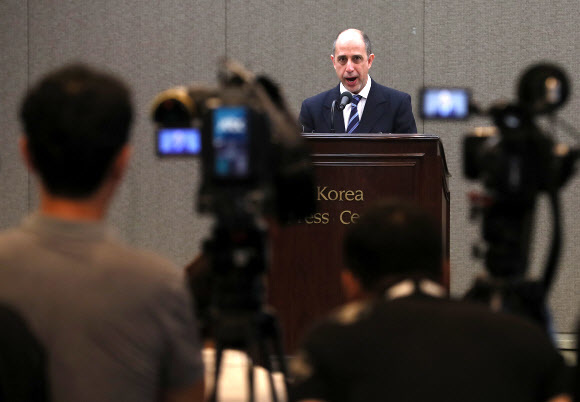 |
|
UN special rapporteur on North Korean human rights Tomas Ojea Quintana announced during a press conference on July 10 that some of the Ryugyong waitresses defected to South Korea “without knowing where they were going” and called for the South Korean government to launch an independent investigation. (Yonhap News)
|
Markedly different response following restaurant manager’s claim that he was misled by NIS
“There has been no change in the government’s position.” This was Ministry of Unification spokesperson Baik Tae-hyun’s response when asked by reporters at a July 16 public briefing about the circumstances behind the Apr. 2016 arrival of female employees from the North Korean restaurant Ryugyong in Ningbo, a city in China’s Zhejiang Province, amid growing suspicions that the mass defection was orchestrated by the National Intelligence Service (NIS) under then-President Park Geun-hye. The exchange concerned new claims by Ryugyong manager Heo Kang-il that the NIS “lured” him by promising to set him up with a restaurant in Southeast Asia if he brought the employees over. Faced with a barrage of questions, Baik remained tight-lipped. “I have nothing else to add,” he said. The ministry’s response was significantly different after a July 10 press conference by UN special rapporteur on North Korean human rights Tomas Ojea Quintana, who claimed that some of the employees arrived in South Korea “without knowing where they were going” and recommended that the South Korean government conduct an independent investigation and assign responsibility. In a public briefing the following day, Baik effectively denied Ojea Quintana’s claims, insisting that the employees “entered of their own free will as far as I know.” What explains Baik’s shift from claiming the employees entered of their own free will to insisting five days later that the government’s position was unchanged? It could be seen as a simple matter of abstraction, with the underlying message remaining the same. But the situation is far more complex. The Ministry of Unification has not held just one position on the issue. On Dec. 28 of last year, the Ministry of Unification’s policy reform committee (under chairman Kim Jong-su) announced that the ministry has made its announcement “passively at the NIS’s request,” adding that it had been “confirmed that the ministry was not aware of the specific intelligence situation.” It also raised issues with a situation it described as “conflicting with a practice of not publicly announcing defection cases.” Already, the Moon Jae-in administration’s Ministry of Unification was trying to distance itself from its actions under the Park administration, when it heavily hyped the “first-ever en masse defection by employees at the same restaurant” and suggested North Korea sanctions had played a role. Soon after Heo Kang-il claimed in a May 10 broadcast appearance that he had been “tricked by the NIS,” the ministry sent a message implying it would be reexamining the case. On May 11, Baik noted that there had been “new claims from the manager and some of the employees about the circumstances of their arrival and the issue of free will” and said the “facts need to be verified.” As far back as late 2017 – and certainly since May of this year – the ministry has distanced itself from the Park administration’s announcement that the employees “arrived of their own accord.” Its approach could be seen as an attempt to lay the groundwork for a “third way.” In that sense, the ministry spokesperson’s reference on July 11 to the employees’ “entry of their own free will” came as a surprise. “I don’t know why [the Ministry of Unification] gave that response,” sighed one senior administration official. Conceding that the issue presents a “dilemma to resolve,” the official said, “At any rate, it is inappropriate to say at the present time that [the employees] entered of their own accord.” Another former official acquainted with the situation described it as a “disaster resulting from bureaucratic inertia.” “You’re not going to find solutions by transparently misrepresenting things,” the former official said. Indeed, lawmakers Chun Jung-bae of the Party for Democracy and Peace and Song Gab-seok of the Democratic Party have openly called for an investigation on the mass defection issue and the assignment of responsibility. It now remains to be seen whether a belated shift in the Ministry of Unification’s official position can open up a “third way.” By Lee Je-hun, senior staff writer Please direct comments or questions to [english@hani.co.kr]






